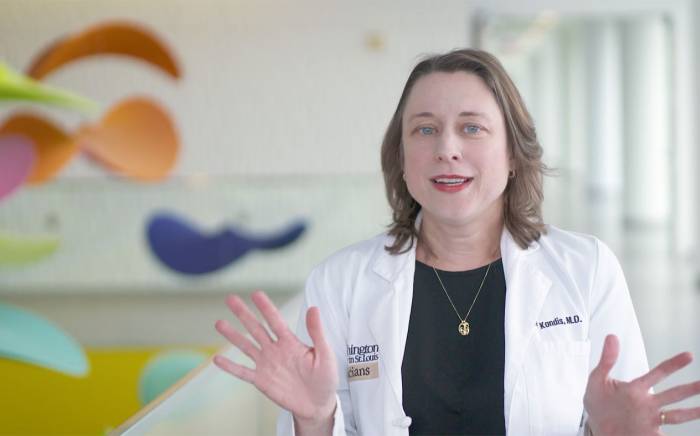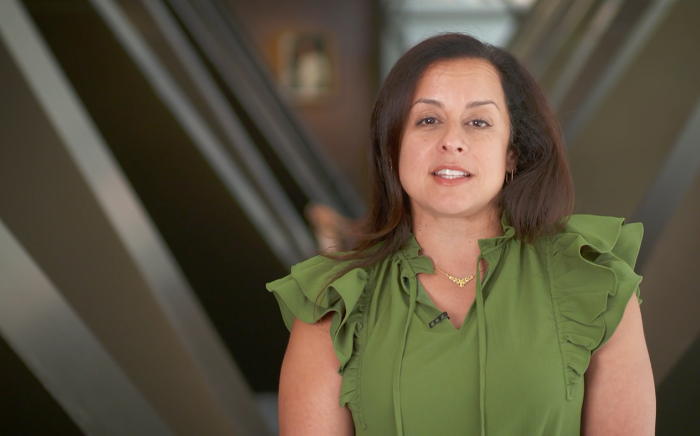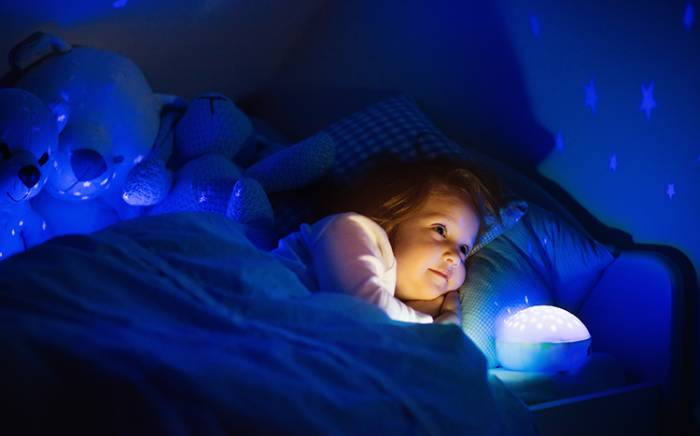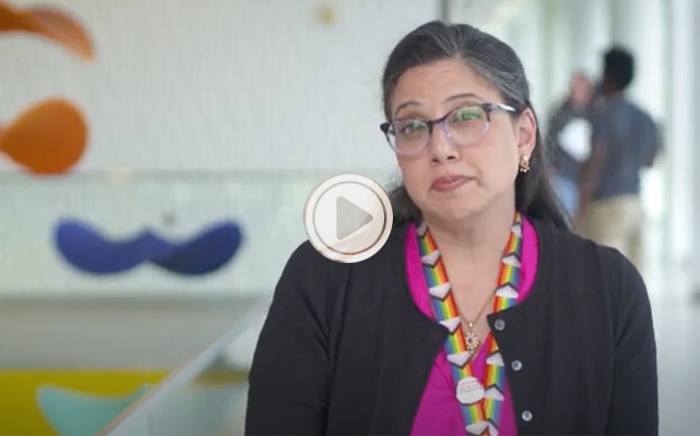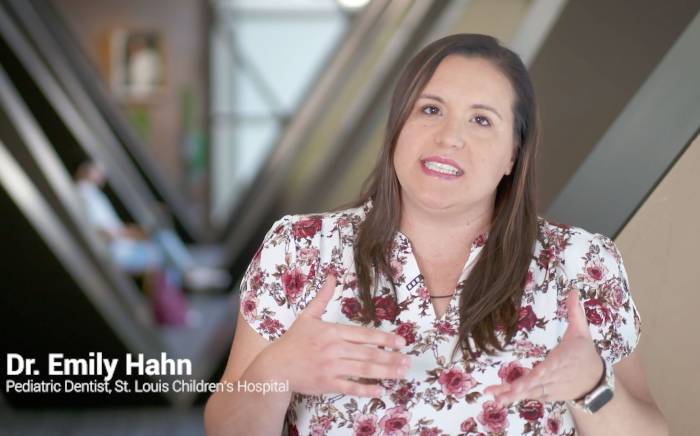An arrhythmia is an abnormal heartbeat. In an arrhythmia, abnormal electrical signals through the heart muscle may cause the heart to beat too fast (tachycardia), too slow (bradycardia), or irregularly. When the heart doesn't beat normally, it isn't able to pump blood to the body as well. That means the brain, lungs, and other organs may not get enough blood. This could cause the organs to not work as well and they may become damaged.
For more information regarding pediatric arrhythmia services in St. Louis or to make an appointment, please call 314.454.5437 or 800.678.5437 or email us.
Complications can happen, depending on the type of arrhythmia and how serious it is. Complications may include:
- Damage to the brain, kidneys, lungs, liver, or other organs
- Heart failure
- Blood clots in the brain may cause a stroke.
- Sudden cardiac death
Types of Arrhythmias
Arrhythmias that can occur in children include:
- Long-Q-T syndrome (LQTS). This is an inherited condition passed from parents to children. It usually affects children and young adults. Many children have no symptoms, but fainting is common in those who do.
- Premature atrial contraction (PAC) and premature ventricular contraction (PVC). PACs or PVCs are abnormal beats that start in the upper chambers of the heart (atria) or the lower chambers of the heart (ventricles). They are common in children and adolescents. Often, they are considered completely normal and harmless.
- Sinus tachycardia. A fast heart rate that occurs with fever, excitement, and exercise. It is normal.
- Supraventricular tachycardia (SVT), paroxysmal atrial tachycardia (PAT), or paroxysmal supraventricular tachycardia (PSVT). This is the most common tachycardia in children. It involves the atria and ventricles. It is not life-threatening. Treatment may be needed if it happens often or lasts long.
- Wolff-Parkinson-White Syndrome (WPW). This is an abnormal electrical signal that gets to the ventricle too quickly. A fast heart rate is a common symptom. Or a child may not have symptoms. Sudden cardiac death may occur.
- Ventricular tachycardia (VT). This is a life-threatening arrhythmia. It may be from serious heart disease. It is caused by a very fast electrical signal from the ventricles. A child may feel weak, tired, dizzy, or may faint (syncope). He or she may also feel his or her heart beat (palpitations).
- Sick sinus syndrome. The heart's natural pacemaker (sinus node) doesn't work as it should. A child usually has both bradycardia and tachycardia. It may occur in children who have had open heart surgery. A child may not have symptoms. A child with symptoms may be tired or dizzy, or may faint.
- Complete heart block. The electrical signal from the upper to lower chambers is blocked. The heart usually beats considerably more slowly. This problem may happen after heart surgery or be caused by heart disease. It may cause a child to faint.
What Causes Arrhythmias In Children?
Some known causes of arrhythmias in children include:
- Congenital heart defects
- Heart problem that is inherited
- Infection
- Abnormal levels of certain chemicals in the blood
- Normal reaction to exercise, fever, or emotions
- Changes in the structure of the heart
- Electrical conduction abnormality
While these are some of the more common causes of an arrhythmia, sometimes the cause of an arrhythmia is unknown.
What Are Symptoms of Arrhythmias?
A child with an arrhythmia may not have any symptoms. For those who do, these are the most common symptoms:
- Feeling weak
- Feeling tired
- Feeling like the heart is fluttering (heart palpitations)
- Low blood pressure
- Feeling dizzy
- Fainting (syncope)
- Not feeding or eating well
The symptoms of an arrhythmia may look like other health conditions or heart problems. If your child is exhibiting any of the above symptoms, make sure your child sees a healthcare provider for a diagnosis.
For more information regarding arrhythmia services in St. Louis or to make an appointment, please call 314.454.5437 or 800.678.5437 or email us.
How Is An Arrhythmia Diagnosed?
If your child is exhibiting signs of an arrhythmia, a doctor will give your child a physical exam with a focus on the heart. Your child may need additional tests, including:
- Electrocardiogram (ECG).:This simple test measures the electrical activity of the heart. An ECG may show an arrhythmia. The test may be a:
- Resting ECG. Your child will lie down while electrodes are connected to the ECG machine by wires. The ECG records the heart's electrical activity for a minute or so.
- Stress test (exercise ECG). Your child is attached to the ECG machine as described above. He or she will walk on a treadmill or pedal a stationary bike while the ECG is recorded. This test is done to check the heart during exercise.
- Holter monitoring: Your child will have his or her heart rhythm checked over 24 to 48 hours. A small portable monitor is worn while your child goes about his or her usual activities
- Electrophysiologic study (EPS): For this test, the doctor puts a small, thin tube (catheter) into a large blood vessel in an leg or arm. The doctor moves the catheter to your child's heart. This test can find out the type electrical signal causing the problem, and where the signal is.
- Tilt table test: This test may be done if your child faints often. The test checks your child's heart rate and blood pressure as he or she changes position.
- Echocardiography (echo): This test uses sound waves to make detailed pictures of your child's heart structure and function.
How Is An Arrhythmia Treated?
Treatment of an arrhythmia will depend on your child’s symptoms, age, and general health. It will also depend on how severe the arrhythmia is. If the arrhythmia is mild, your child may not need treatment.
If your child does need treatment for an arrhythmia, treatment may include:
- Radiofrequency ablation: This procedure uses a special catheter to stop the abnormal electrical signals.
- Surgery: Surgery can stop an abnormal heart rhythm.
- Pacemaker: An artificial pacemaker may be needed with some arrhythmias. The pacemaker is a small device that is put inside the abdomen or chest. It gives a small amount of electricity to the heart to keep it beating regularly. Your child may need this if he or she has a slow heart rate.
- Implantable cardioverter defibrillator (ICD): This is another type of device that is put in the chest or abdomen. It automatically sends a shock to stop an abnormal rhythm. Some ICDs also work as pacemakers.
Some arrhythmias do not cause any problems. Some are more serious. A child with a serious arrhythmia will need frequent checkups and regular tests. Or your child may not be able to take part in some sports or activities.
For more information regarding pediatric arrhythmia services in St. Louis or to make an appointment, please call 314.454.5437 or 800.678.5437 or email us.





